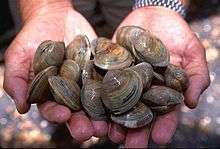clam
English

Pronunciation
- IPA(key): /klæm/
- (æ-tensing) IPA(key): [kleəm]
Audio (US) (file) - Rhymes: -æm
Etymology 1
From Middle English clam (“pincers, vice, clamp”), from Old English clamm (“bond, fetter, grip, grasp”), from Proto-Germanic *klam (“press, squeeze together”). The sense “dollar” may allude to wampum.
Noun
clam (plural clams)
- A bivalve mollusk of many kinds, especially those that are edible; for example the soft-shell clam (Mya arenaria), the hard clam (Mercenaria mercenaria), the sea clam or hen clam (Spisula solidissima), and other species. The name is said to have been given originally to the Tridacna gigas, a huge East Indian bivalve.
- 1913, Joseph C. Lincoln, chapter 3, in Mr. Pratt's Patients:
- My hopes wa'n't disappointed. I never saw clams thicker than they was along them inshore flats. I filled my dreener in no time, and then it come to me that 'twouldn't be a bad idee to get a lot more, take 'em with me to Wellmouth, and peddle 'em out. Clams was fairly scarce over that side of the bay and ought to fetch a fair price.
-
- Strong pincers or forceps.
- A kind of vise, usually of wood.
- (US, slang) A dollar (usually used in the plural).
- Those sneakers cost me fifty clams!
- (slang, derogatory) A Scientologist.
- 1998 February 23, jesparolini, “CO$ Celebrities: USEFUL IDIOTS”, in alt.religion.scientology, Usenet:
- So the clams have John Travolta, Tom Cruise, et al in their hot li'l ol'P-R hands […]
-
- (slang) A vagina.
- (informal) One who clams up; a taciturn person, one who refuses to speak.
Derived terms
Translations
|
|
Verb
clam (third-person singular simple present clams, present participle clamming, simple past and past participle clammed)
Translations
|
See also
Etymology 2
Noun
clam (plural clams)
- A crash or clangor made by ringing all the bells of a chime at once.
- (Can we find and add a quotation of Nares to this entry?)
Verb
clam (third-person singular simple present clams, present participle clamming, simple past and past participle clammed)
- To produce, in bellringing, a clam or clangor; to cause to clang.
- (Can we find and add a quotation of Nares to this entry?)
Etymology 3
From Middle English clammen (“to smear, bedaub”), from Old English clǣman (“to smear, bedaub”). Cognate with German klamm (“clammy”). See also clammy (“damp, cold and sticky”) and clem (“to adhere, stick, plug (a hole)”).
Adjective
clam (comparative clammer, superlative clammest)
- (obsolete) clammy.
- 1808, John Jamieson, An Etymological Dictionary of the Scottish Language:
- Ice is said to be clam, when beginning to melt with the sun or otherwise, and not easy to be slid upon.
- 1808, John Jamieson, An Etymological Dictionary of the Scottish Language:
Verb
clam (third-person singular simple present clams, present participle clamming, simple past and past participle clammed)
- To be moist or glutinous; to stick; to adhere.
- (Can we find and add a quotation of Dryden to this entry?)
- To clog, as with glutinous or viscous matter.
- L'Estrange
- A swarm of wasps got into a honey pot, and there they cloyed and clammed themselves till there was no getting out again.
- L'Estrange
Etymology 4
Noun
clam (plural clams)
Part or all of this entry has been imported from the 1913 edition of Webster’s Dictionary, which is now free of copyright and hence in the public domain. The imported definitions may be significantly out of date, and any more recent senses may be completely missing.
(See the entry for clam in Webster’s Revised Unabridged Dictionary, G. & C. Merriam, 1913.)
Catalan
Latin
Etymology
From Proto-Indo-European *ḱl-, zero-grade form of *ḱel- (“to hide, conceal”). Cognate to Latin cēlō.
Pronunciation
- (Classical) IPA(key): /klam/, [kɫã]
- (Ecclesiastical) IPA(key): /klam/
Preposition
clam (+ accusative, ablative)
- (with accusative or, rarely, ablative) without the knowledge of, unknown to
- 163 B.C.E. Terence, Heauton Timorumenos, Act II, Scene II:
- Neque adeo clam me est.
- Nor indeed is it unknown to me.
- Neque adeo clam me est.
- 163 B.C.E. Terence, Heauton Timorumenos, Act II, Scene II:
Derived terms
- clanculō
- clanculum
Related terms
- clanculārius
- clandestīnō
- clandestīnus
References
- clam in Charlton T. Lewis and Charles Short (1879) A Latin Dictionary, Oxford: Clarendon Press
- clam in Charlton T. Lewis (1891) An Elementary Latin Dictionary, New York: Harper & Brothers
- clam in Charles du Fresne du Cange’s Glossarium Mediæ et Infimæ Latinitatis (augmented edition, 1883–1887)
- clam in Gaffiot, Félix (1934) Dictionnaire Illustré Latin-Français, Hachette